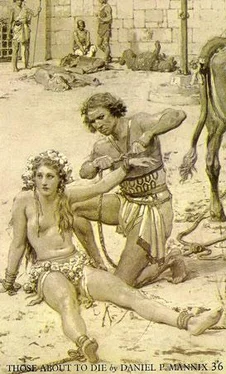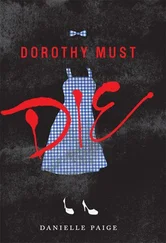The growth, character, and final degeneration of the ludi closely paralleled the growth, character and degeneration of the Roman empire. In the old, simple days of the republic, the games were simply athletic contests. As Rome became a conquering power, the games became bloody, ruthless and fierce, although still retaining a conception of fair play and sportsmanship. This was the era when Augustus had to pass laws forbidden patricians from jumping into the arena and fighting it out with professional gladiators, and a young noble would challenge a victorious German prisoner to a fight to the death. When Rome finished her conquests and became merely a despotic power, the games became pointlessly cruel. Toward the end they were nothing but sadistic displays. Shortly after this period, the empire collapsed.
Any modern promoter who cared to put on a series of shows duplicating the Roman games would easily be able to fill the house. Mickey Spillane could be Master of the Games. Bullfights, cockfights, dogfights, and the Indianapolis Speedway (our closest approach to the chariot races) are all popular. I even find it hard to believe that all boxing fans are primarily interested in the fine points of the sport rather than in seeing two men half kill each other. If they knew that one man really would be killed, they'd enjoy it all the more. The most popular programmes on TV are the Westerns showing men shooting each other. The next most popular are the gangster films. Of course, the men don't actually kill each other—if they did you couldn't get people away from their sets.
The Roman games were probably the biggest argument against "spectator sports" that can be advanced. As long as the Romans were themselves a nation of fighting men, there might have been some truth to the beliefs of Cato and Pliny that the games encouraged manly virtues. But there is a big difference between tough fighting men, appreciatively watching a struggle between equally matched opponents, and a depraved crowd gloating over scenes of meaningless cruelty.
The same tendency can be seen today in rough sports. The spectator who hollers, "Murder the bums! Knock his teeth out! Kill him!" is usually a meek little guy in a rear seat who has just got a bawling out from his boss and had to sneak out of the house when his wife wasn't home. He wants to see somebody else get hurt ... he doesn't care who.
the end
Author's Note
So many sources were used in preparing this volume that it would be impossible to name them all. In many cases, only a single reference was taken from a book. However, some of the main works dealing with the games are listed in the Bibliography. Some of the sequences, especially in the description of the shows at the time of Carpophorus, are a compendium of many sources. In describing how Carpophorus trained the animals that had relations with women, I used Apuleius and also the technique employed by a Mexican gentleman I met in Tia Juana who was making 16mm. stag films on the subject.
The description of the venatores' battle with the lions and tigers is a combination of original sources, J. A. Hunter's account of Masai warriors spearing lions, and comments from Mel Koontz and Marbel Stark, both of whom are professional lion tamers. The crocodile wrestling is described by Strabo, but I added material told me by a Seminole Indian who wrestled alligators in Florida. The gladiatorial combats are all taken from contemporary accounts or from graffiti (wall drawings) in Pompeii. The bullfights are from graffiti of the fights, contemporary descriptions, the murals in Knossus, incidents I've observed in Spanish bullfights, and suggestions made by Pete Patterson, who is a rodeo clown.
The battle between the Essedarii and the Greek Hoplites is a combination of Tacitus' description of British war chariots, Hogarth's description of the Hoplite phalanx in Philip and Alexander of Macedon, extracts from Mason's Roping, and the manner in which a British square was handled in the early nineteenth century. The elephant fights come from contemporary sources and Capt. Fitz-Barnard, who saw war elephants in action in India.
The description of Chilo's tavern is taken from Amedeo Maiuri's Pompeii and my own notes on a wine shop there. The conversation between the men is nearly all from Petronius' Satyricon. Although my account of Carpophorus' death is completely fictitious, polar bears were seen in the arena, possibly as early as Nero's reign. The Romans did believe that the narwhal's horn was that of a unicorn. The narwhal, being a mammal like a whale or porpoise, can produce ivory.
BIBLIOGRAPHY
Darstellungen aus der Sittengeschichte Roms, L. Friedlander Animals for Show and Pleasure in Ancient Rome,
George Jennison The Spectacles, Martial
The Remains of Ancient Rome, J. H. Middleton
Trebaid, Stattus
Historia Ecclesiastica, Eusebius
Martyr's Mirror, Thielem von Bracht
Acts of the Martyrs, P. I. Twisck
Pompeii, Thomas H. Dyer
Philip and Alexander of Macedon, David G. Hogarth
Les Gladiateurs dans l'orient Grec, Louis Robert
Roping, Bernard Mason
Fighting Sports, Capt. L. Fitz-Barnard
The Satyricon, Petronius
The Memoirs of Diocles
And the writings of Tacitus, Suetonius, Apuleius
Fiction
I, Claudius and Claudius the God, Robert Graves
Quo Vadis, Henryk Sienkiewicz
Confessors of the Name, Gladys Schmitt (Mainly the martyrdom of the Christians)
Ben Hur, Lew Wallace (The famous chariot race is very accurate) The Gladiators,
Arthur Koestler (The Spartacus Rebellion)
Androcles and the Lion, Bernard Shaw (Humorous but accurate)












